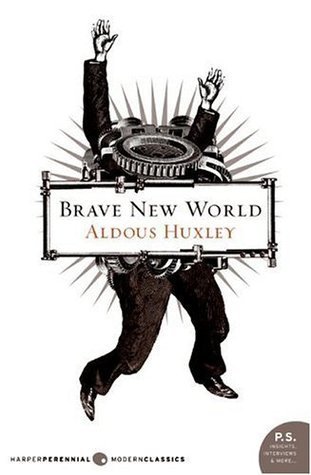Brave New World by Aldous Huxley
Review of Brave New World by Aldous Huxley
Brave New World by Aldous Huxley (1932). Published by Harper Perennial Modern Classics.
I will admit: there are so many books I read throughout my high school experience that I did not care for.
I can confidently say, though, there are two books I read my last two years of high school that I thought were absolutely brilliant, and that I wanted to return to later in life: Invisible Man and Brave New World.
I still have not returned to Invisible Man yet as of writing this, but I have owned my copy of Brave New World ever since I read it in my high school AP Literature course in the 12th grade. I’ve been staring at it lately, and decided to pick it up and see how it holds up in my mind.
So I ventured back into the depths of Huxley’s book, having known a little bit more about the world, and even the history of the period he was writing within. I read the book over a course of a week, which isn’t bad for me.
Let’s get into the review!
A dystopia look at what the world could be through indoctrination and genetic-based breeding.
Aldous Huxley, for some historic background, was the brother of a big eugenicist, and he wrote this novel in the early 1930s. This is when we were gearing up for war slowly but surely, but there were dramatic changes with the introduction of the assembly line, and eugenics were having their heyday at this time. It’s not a coincidence that Nazi Germany adopted these ideologies when the rest of the Western world was actively promoting it.
That said, this novel takes place in 2540, or 632 AF (after Ford). The scene is London. Humans are bred through artificial wombs and are put through indoctrination programs, and we meet two of our main characters off of the bat. Lenina is a hatchery worker well-loved by the people around her, but Bernard Marx, a psychologist, is not very desired.
He’s shorter than other people in his caste, and he has come to understand how people are kept under control in their society. They use a drug called soma to keep them content, and Bernard keeps saying things that will very much get him in trouble—his boss is even considering shipping him off to Iceland.
Bernard and Lenina head to New Mexico, where there are a group of natural born people who live the natural way. They make observations of disease and language within these communities, and they see Linda and John. Linda was accidentally left behind by a group from their state, and then she got pregnant.
She did not return home out of the shame of her pregnancy, and had John. John never was accepted byt he villagers, and they find their lives very difficult here. Because John has only had Shakespeare to read, he only articulates his thoughts through dramatic monologues like Shakespeare’s characters.
Now, they want to go back to England, which John calls the brave new world. Bernard takes them back, but when John calls the Director father (he is his real father), it causes an uproar and the director is forced to resign. Bernard is demoted to be the guardian of John, who is considered a “savage” yet a celebrity.
John only becomes friends with Bernard’s writer friend Helmholtz, and Bernard’s new popularity fades quickly. John starts refusing to go to events throughout society, deeming them shallow and empty. He also is attracted to Lenina, but is disgusted at how she has a free attitude for sex.
He discovers his mother is dying, and rushes to be with her. This causes another scandal, as people here do not do that. John then tries to stop the soma distribution for a lower caste under the guise of freeing them from their influences, but then a riot happens.
Bernard, Helmholtz, and John are taken to a higher power, and Bernard and Hemholtz are exiled. Bernard does not want this, but Hemholtz sees it as an opportunity to be free. John rejects yet again everything this new world stands for, but the head refuses to exile him.
He then moves into a lighthouse and lives an isolated life. He self-flagellates, and people come to watch him do the act. A documentary is filmed about him, and then it becomes an international sensation. Helicopters arrive with even more people to watch, including Lenina. John whips her and himself, and the crowd, fascinated by this, goes into an orgy.
John wakes up the next morning in regret, and when the next group of helicopters come, they find John dead: he hanged himself.
Overall Thoughts
A hundred years’ later, I think this is a novel that stands the test of time so well. We see how people are still like this today when it comes to mob mentality, especially considering it’s evolved with technology.
Huxley also does this book in such a way that makes it compelling, yet so disturbing.
I also wonder how Huxley would react to today’s world. He was known to think the Americans were too promiscuous, hence how he bases Lenina off of this attitude.
It’s interesting how he depicts this as a woman, as one could interpret it as a bit of woman blaming for these kinds of attitudes.
Such a fascinating novel though. Do go read it if you haven’t already.
Follow me below on Instagram and Goodreads for more.


![Jeju-do (제주도) is one of those places that reminds you of how stunning the world is
[7.12.2024 부터 7.14.2024 까지]](https://images.squarespace-cdn.com/content/v1/5ea1f794501b7153b29e7cd7/1721033601522-554E76HR01JUHDWZBJ1I/image-asset.jpeg)









